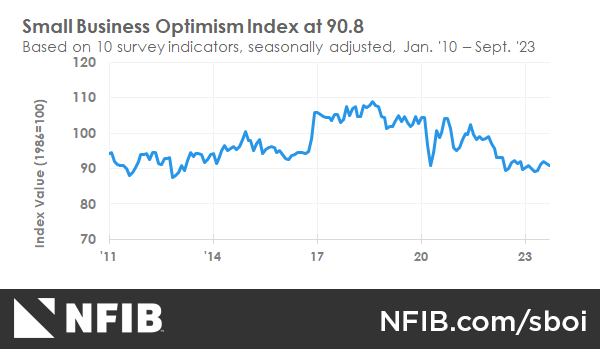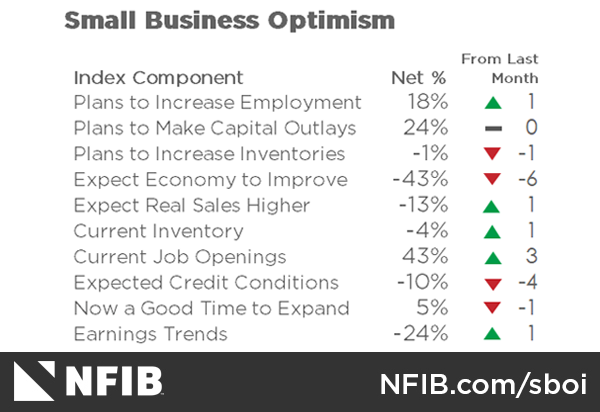GoVets' Top 10 Takeaways from the 2023 NFIB Small Business Economic Trends Report
Introduction:
Small businesses are the backbone of our economy, and understanding their economic trends is crucial. The NFIB Small Business Economic Trends Report for September 2023 offers valuable insights into the challenges and opportunities faced by small business owners. In this blog post, GoVets presents the top 10 takeaways from this report, shedding light on the state of small businesses in the current economic landscape. We then compare this report with the results from the 2023 Verizon Small Business Survey.
Top 10 Takeaways
Takeaway #1. Small Business Optimism Index:
The NFIB Small Business Optimism Index dipped to 90.8 in September 2023, marking the 21st consecutive month below the 49-year average. Inflation remains a top concern for 23% of business owners, impacting their optimism about future business conditions.
Takeaway #2. Hiring Challenges:
Small business owners are struggling to fill job openings, with 43% reporting difficulty finding qualified applicants. Despite high job openings, plans to create new jobs have decreased from previous highs.
Takeaway #3. Capital Spending:
57% of owners reported capital expenditures in the last six months, with investments in equipment, vehicles, and facilities. However, views about future economic conditions are not supportive of increased investment.
Takeaway #4. Inflationary Pressures:
The report highlights that 29% of owners raised their average selling prices, reflecting inflationary pressures. Inflation is a top concern for 23% of business owners.
Takeaway #5. Credit Markets:
Some owners reported difficulties in obtaining loans, with 2% stating their borrowing needs were not met. Financing was a top business problem for 4% of owners, and 26% reported higher loan rates.
Takeaway #6. Compensation and Earnings:
A net 36% of owners raised compensation, while 23% planned to raise it in the next three months. Labor costs were a top business problem for 9% of owners.
Takeaway #7. Sales and Inventories:
A net negative 8% of owners reported higher nominal sales in the past three months, reflecting challenges in sales growth. Inventory gains improved, but shortages were still reported in various sectors.
Takeaway #8. Economic Outlook:
The report suggests that the economy is treading on thin ice, with potential challenges ahead. The balance of power in Congress and political factors may impact the economic landscape for small businesses.
Takeaway #9. Inflation as a Challenge:
Inflation remains a significant concern for small business owners, leading to price hikes and squeezing profit margins. Rising input and labor costs contribute to this challenge.
Takeaway #10. Investment and Regulatory Environment:
Investment rates in small businesses are historically low due to increased costs and regulatory compliance. The report emphasizes the need for government support and policy alignment to aid small business growth.


Comparison with the 2023 Verizon Small Business Survey:
Comparing the results of the NFIB Small Business Economic Trends Report with the 2023 Verizon Small Business Survey reveals some common themes and differences. Both reports highlight concerns about inflation and the challenges of finding qualified workers.
However, the NFIB report emphasizes the struggle small business owners face in filling job openings, while the Verizon survey focuses on small businesses' adoption of technology, such as AI, to address various operational challenges. Both reports underscore the impact of economic conditions on small businesses but provide different angles of analysis.
Summary
In conclusion, these reports collectively showcase the diverse landscape of challenges and opportunities faced by small businesses in 2023. While each report provides valuable insights in its own right, a comprehensive understanding of the small business ecosystem requires consideration of various factors, including economic trends, technology adoption, and regulatory impacts. Small businesses continue to be a critical driver of the economy, and supporting their growth remains essential.

